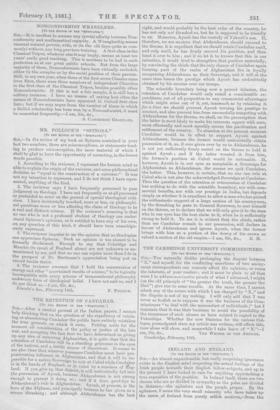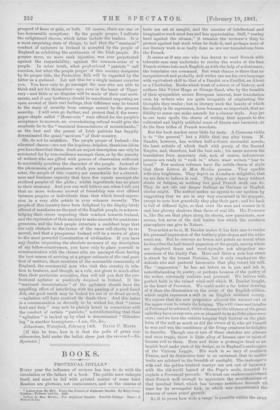IRELAND AND ENGLAND.
[To THE EDITOR OF Till' " SPECTATOR"]
Sm„—An almost unpardonable but really surprising ignorance exists in the English mind respecting the actual feelings of the Irish people towards their English fellow-subjects, and up to the present I have looked in vain for anything approaching a true exposition of the position. In Ireland itself', there are two classes who are as divided in sympathy as the poles are divided in distance,—the agitators and the people proper. By the agitators, I mean the very small minority who have taken up the cause . of Ireland from purely selfish motives,—from the prospect of fame or gain, or both. Of course, there are one or two honourable exceptions. By the people proper, I indicate the enlightened classes, which latter include the traders. It is a most surprising state of things, to feel that the "maniacal" conduct of agitators in Ireland is accepted by the people of England as exhibiting the sentiments of the Irish people. No greater error, no more rank injustice, was over perpetrated against the respectability, against the common-sense of a people. In sober truth, what professional " patriots " call coercion, but what the people proper of this country designate by its proper title, the Protection Bill, will be regarded by the latter as a godsend, Let not this for a single instant surprise you. You have only to go amongst the men who are able to think and act for themselves—aye, oven in the heart of Tippe- rary—.and little or no disguise will be made of their real senti- ments, and if any hesitancy should be manifested respecting an open avowal of their real feelings, that diffidence may be traced to the want of security from outrage caused by the present anarchy. I will even go farther, and protest that if the news- paper staple called " Home-rule " were offered for the people's acceptance to-morrow, an overwhelming refusal would give the emphatic lie to the "maniacal denunciations of mountebanks," as the best and the purest of Irish patriots has happily denominated the quasi." saviours" of their country.
Sir, do not be mistaken., The people proper of Ireland—the educated classes—are not the hopeless, helpless, thankless idiots you have described them. Such an unjust description can only be accounted for by non-residence amongst them, or by the paucity of writers who are gifted with powers of observation sufficient to accurately pourtray the character of the people. Instead of the phenomena of paradoxes which you ascribe to their char- acter, the people of this country are remarkable for a shrewd- ness and business capacity that have few equals amongst the civilised peoples of the globe ; whilst ingratitude has no place in their economy. And you can well believe me, when I tell you that no more welcome avowal of friendship was ever offered between peoples or individuals than that which found expres- sion in a very able article in your columns recently. The people of this country have 'been delighted by the display lately offered of manliness on the part of the English people, in ackn ow- lodging their errors respecting their conduct towards Ireland, and the expression of their anxiety to make amends for past trans- gressions, and the Irish people entertain a confident hope that the only obstacle to the fusion of the races will shortly be re- moved, and that a prosperous Ireland will be a crown of glory to the most powerful Constitution of civilisation. If you have any doubts respecting the absolute accuracy of my description of my fellow-countrymen, you have only to place yourself in communication with the classes who are amongst those having the best means of arriving at a proper estimate of the real posi- tion of matters, those members of the mercantile community of England, the commercial men who visit this country in rela- tion to business, and though, as a rule, not given to much other than their particular avocation, they will tell you that the pro- fessional agitator is positively despised in Ireland. If the "maniacal denunciations" of the agitators should have the appalling effect of interfering with the passing of a good Laud Act, one good result may be looked for out of so dread an evil, —agitation will have received its death-blow. And this latter is a consummation 80 devoutly to be wished for, that "curses
loud and deep" may now be plainly heard in connection with the conduct of certain "patriots," notwithstanding that their " agitation" is backed up by what is denominated " filibuster- ing " in another hemisphere.--I am, Sir, Sic.,
johnstousa, Waterford, February 14th. DAVID C. HAYES.
[If this be true, bow is it that the polls of great con- stituencies, held under the ballot, show just the reverse P—En. Spectator.]



































 Previous page
Previous page